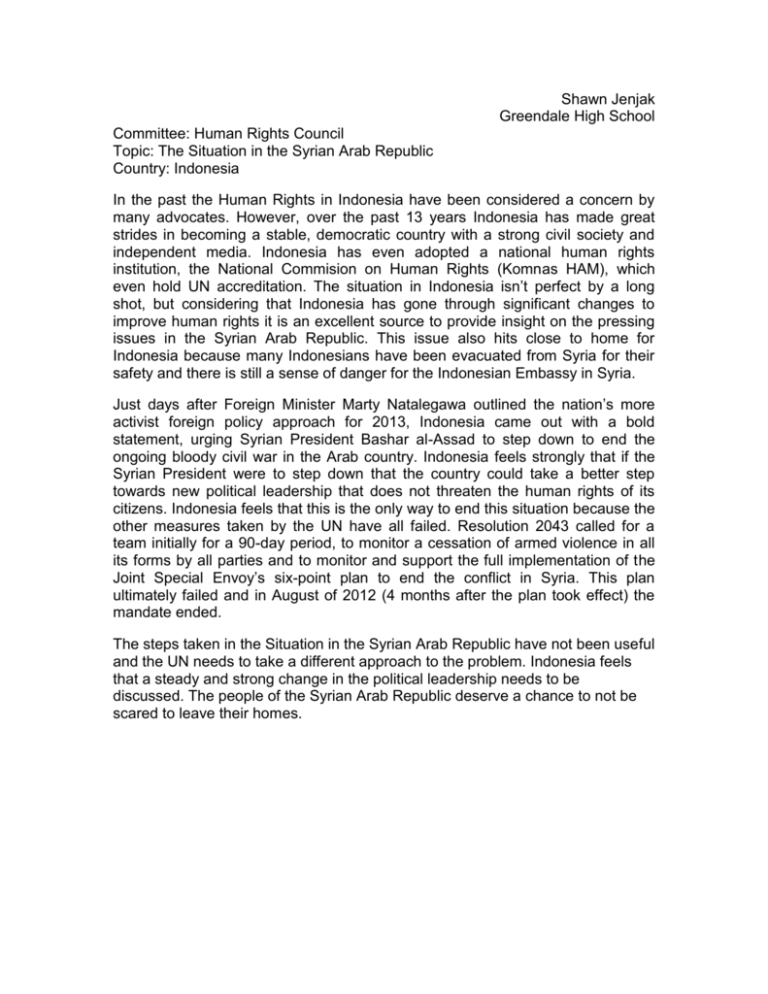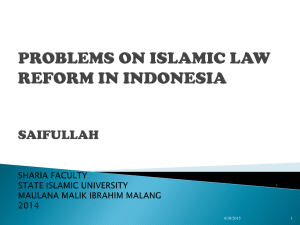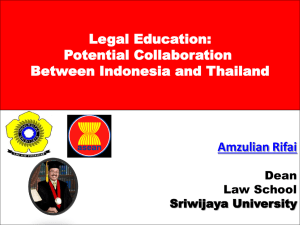Shawn Jenjak Greendale High School Committee: Human Rights
advertisement

Shawn Jenjak Greendale High School Committee: Human Rights Council Topic: The Situation in the Syrian Arab Republic Country: Indonesia In the past the Human Rights in Indonesia have been considered a concern by many advocates. However, over the past 13 years Indonesia has made great strides in becoming a stable, democratic country with a strong civil society and independent media. Indonesia has even adopted a national human rights institution, the National Commision on Human Rights (Komnas HAM), which even hold UN accreditation. The situation in Indonesia isn’t perfect by a long shot, but considering that Indonesia has gone through significant changes to improve human rights it is an excellent source to provide insight on the pressing issues in the Syrian Arab Republic. This issue also hits close to home for Indonesia because many Indonesians have been evacuated from Syria for their safety and there is still a sense of danger for the Indonesian Embassy in Syria. Just days after Foreign Minister Marty Natalegawa outlined the nation’s more activist foreign policy approach for 2013, Indonesia came out with a bold statement, urging Syrian President Bashar al-Assad to step down to end the ongoing bloody civil war in the Arab country. Indonesia feels strongly that if the Syrian President were to step down that the country could take a better step towards new political leadership that does not threaten the human rights of its citizens. Indonesia feels that this is the only way to end this situation because the other measures taken by the UN have all failed. Resolution 2043 called for a team initially for a 90-day period, to monitor a cessation of armed violence in all its forms by all parties and to monitor and support the full implementation of the Joint Special Envoy’s six-point plan to end the conflict in Syria. This plan ultimately failed and in August of 2012 (4 months after the plan took effect) the mandate ended. The steps taken in the Situation in the Syrian Arab Republic have not been useful and the UN needs to take a different approach to the problem. Indonesia feels that a steady and strong change in the political leadership needs to be discussed. The people of the Syrian Arab Republic deserve a chance to not be scared to leave their homes. Shawn Jenjak Greendale High School Committee: Human Rights Council Topic: The Right to Water Country: Indonesia Over 100 million people in Indonesia lack access to safe water and more than 70 percent of the country’s 220 million population relies on water obtained from potentially contaminated sources. This is a huge problem that needs to be more looked into. If 70 percent of a country is getting their water from a possibly contaminated source that is just unacceptable. The Right to Water is a pressing issue that needs to be resolved. In Indonesia there are over 5000 rivers, most of which do not carry safe drinking water. If even half of those rivers were cleaned it would provide safe water for the rest of the country. There are some great ideas that Indonesia has that could possibly inspire other countries to do the same. Kruha (the People’s Coalition for the Right to Water) is a coalition of more than 30 Indonesian organizations, each working to ensure water access for all Indonesians, especially the marginalized. Kruha was formed in 2002 as Indonesia was debating a new World Bank-influenced water law. The law passed in 2005, and favours privatization of the control and management of the country’s water resources. This is just one step towards the Right to Water. The Right to Water was declared a basic human right back in July of 2010 by the UN. This means that there should be no problem convincing other governing bodies to help fight for access to water. Indonesia feels that there needs to be a governing body that works with the UN to monitor other nations and their steps to help provide an access point to safe drinking water to their citizens. WIth the help of other member states this task would not be financially difficult. All it would take would be some heads from some major countries to lead a team that occasionally checks up on the progress made by different countries. Since the deadline is approaching for the Millennium Development Goals, this is just one way to help speed up the progress so we can complete those goals and help every country have a better access to global clean water.






